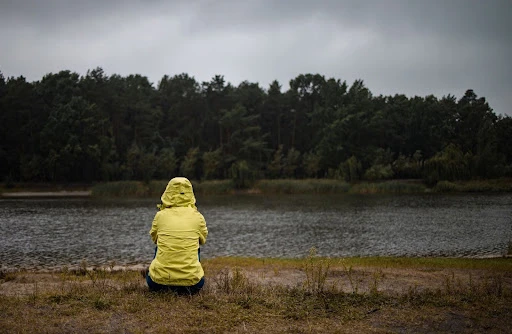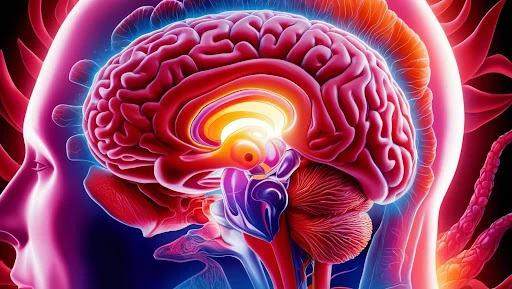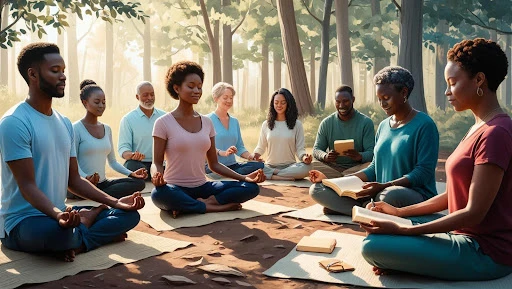The Role of Spirituality in Mental Health During Isolation: Finding Light in the Darkness
Hey there,
Let’s talk about a subject that hits close to home for so many of us:
Isolation.
The long months of social distancing or the quiet moments we spend alone in a noisy world…
Isolation can feel heavy, like a fog that’s hard to lift.
But there’s a powerful tool that can help us find clarity and hope during those times:
Spirituality.
Studies show that engaging in spiritual practices can significantly boost your mental health…
Especially during periods of isolation and despair.
And you know what?
This makes perfect sense when you consider the role of the pineal gland…
Your spiritual compass and connection to higher states of consciousness.
Today, I want to explore how spirituality supports mental health, why it’s so effective in combating the effects of isolation…
And how your pineal gland plays a key role in this process.
So, grab a cup of tea, settle in, and let’s dive into the healing power of the soul.
The Mental Toll of Isolation

First, let’s acknowledge what isolation does to the mind.
Humans are social creatures.
We’re wired for connection.
When that connection is taken away, it can lead to:
- Increased Stress and Anxiety: The uncertainty and lack of interaction can ramp up feelings of worry and fear.
- Depression and Loneliness: The absence of social bonds can lead to a sense of hopelessness or disconnection.
- Cognitive Decline: Prolonged isolation has even been linked to reduced mental sharpness and memory issues.
The good news? Spirituality offers a powerful counterbalance to these effects.
Spirituality as a Lifeline During Isolation

Spirituality, in its many forms, has long been a source of comfort and resilience during tough times.
But what makes it so effective, especially during isolation?
1. A Sense of Connection
At its core, spirituality is about connection…
Whether it’s to a higher power, the universe, or your inner self.
This connection reminds us that we’re never truly alone, even in our darkest moments.
2. Emotional Resilience
Engaging in spiritual practices like prayer, meditation, or journaling helps us process emotions and build resilience.
It creates a safe space to explore our feelings and find peace amidst chaos.
3. Meaning and Purpose
Isolation can make life feel aimless, but spirituality provides a sense of purpose.
It encourages us to reflect on what truly matters and align with our core values.
4. Rituals and Routine
Rituals, such as lighting a candle, meditating, or attending a virtual service…
Give us structure.
They anchor us in the present moment and create a sense of stability.
The Science-Backed Benefits of Spirituality on Mental Health
It’s not just anecdotal.
Science backs up the connection between spirituality and mental health.
Here are a few key findings:
- Lower Stress Levels: Spiritual practices like meditation have been shown to reduce cortisol, the stress hormone.
- Improved Emotional Regulation: Studies reveal that spiritual engagement helps individuals manage their emotions more effectively.
- Increased Resilience: People with strong spiritual beliefs report higher levels of resilience in the face of adversity.
Better Sleep: Practices like meditation support better sleep, which is crucial for mental well-being.
The Pineal Gland’s Role in Spiritual and Mental Health

Now, let’s bring in the pineal gland.
This tiny, pea-shaped gland in your brain is called the “seat of the soul” for a reason.
It’s responsible for producing melatonin, which regulates sleep and circadian rhythms…
But it also plays a crucial role in spiritual awareness.
1. Regulating Sleep and Mood
A healthy pineal gland ensures balanced melatonin production…
Which directly impacts your sleep quality and emotional stability.
Poor sleep is one of the biggest contributors to anxiety and depression…
So, keeping your pineal gland in good shape is essential.
2. Intuition and Connection
The pineal gland, usually associated with the third eye, is believed to be the bridge between the physical and spiritual realms.
When activated, it enhances your ability to connect with your intuition and feel a sense of oneness with the universe.
3. Supporting Resilience
During times of isolation, your pineal gland can guide you toward practices that nourish your soul…
Like meditation, visualization, and deep reflection.
How to Use Spirituality to Support Mental Health During Isolation

If you’re feeling the effects of isolation or just want to strengthen your mental health…
Here are some ways to incorporate spirituality into your life:
1. Daily Meditation
Spend just 10-15 minutes a day in quiet reflection or meditation.
Focus on your breath, visualize your third eye, and set an intention for the day.
This simple practice can calm your mind and reconnect you with your inner self.
2. Gratitude Journaling
Write down three things you’re grateful for each day.
Gratitude shifts your focus from what’s lacking to what’s abundant…
Creating a positive mental and emotional state.
3. Virtual Spiritual Communities
Join online groups or attend virtual services that resonate with your beliefs.
The sense of community can combat feelings of loneliness and create meaningful connections.
4. Engage with Nature
Even if you’re isolated, spending time in nature, whether it’s a walk in the park or simply sitting in your backyard…
Can ground you and remind you of your connection to the natural world.
5. Detox Your Pineal Gland
Support your pineal gland with these tips:
- Avoid fluoride in water and toothpaste.
- Eat foods like turmeric, chlorella, and raw cacao, which help detoxify the gland.
- Practice mindfulness to clear mental clutter and enhance your spiritual connection.
Personal Reflection: My Own Experience with Isolation
Let me share something personal.
During a particularly tough period in my life, I found myself feeling disconnected and overwhelmed.
It wasn’t just about being physically alone…
It was the emotional weight of isolation that got to me.
What pulled me out of that fog? Spirituality.
I started meditating daily, journaling about my fears and hopes, and reconnecting with my core beliefs.
And yes, I worked on decalcifying my pineal gland…
Which made a huge difference in my ability to think clearly and feel connected.
Spirituality reminded me that isolation isn’t just a physical state.
It’s a mindset.
And with the right tools, we can shift that mindset and find peace, even in solitude.
What’s Your Take on Spirituality and Mental Health?
Have you turned to spiritual practices during times of isolation?
What’s worked for you, and what hasn’t?
Hit reply and share your story!
I’d love to hear how spirituality has supported you.
In the end, you’re never truly alone.
There’s always a way to find light in the darkness.
See you next time,
Eric Thompson

